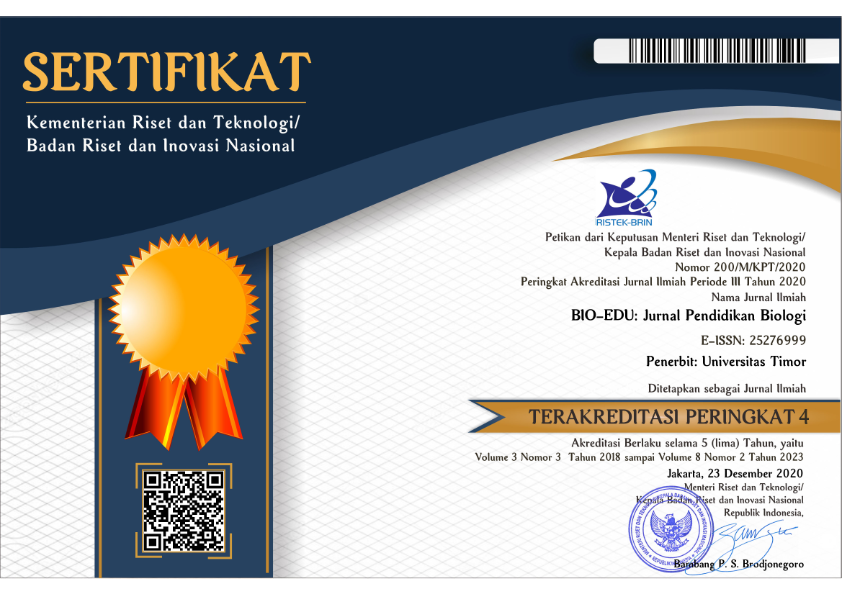Seleksi Cekaman Kekeringan Secara In Vitro Tunas Jagung Putih (Zea mays L.) Menggunakan PEG
DOI:
https://doi.org/10.32938/jbe.v6i2.1521Keywords:
Cekaman kekeringan”; “kultur jaringan”; “PEG’; “seleksi in vitroAbstract
This study aims to identify the morphology response of white corn (Zea mays L) shoots explant on in vitro drought stress selection using Polyethylene glycol (PEG). The study was conducted at the Biology Education Laboratory, University of Timor using a Completely Randomized Design (CRD) with three treatment concentrations of PEG, namely PEG 0 gr/L (control), PEG 5 gr/L, and 15 gr/L. The explants grown on Murashige & Skoog (MS) basal media with PEG according to the treatment concentration. Parameters observed were root length, shoot height and plant biomass to see plant response to drought stress. Data were analyzed using SPSS and further test using DMRT. The results showed that the concentration of PEG gradually could affect plant growth, especially shoot height. PEG concentration of 5 gr/ml and 15 gr/ml was the highest shoot growth (2,625 cm) when compared to PEG 0 gr/L (1.47) which indicated that explants could still grow under drought stress conditions. However, both treatments showed no effect of PEG on root length and biomass which could indicate growth inhibition in the given selection. Based on the results it can be concluded that PEG selection can affect the growth rate of white corn shoots and growth inhibition.
Downloads
Published
Issue
Section
License
The Authors submitting a manuscript do so on the understanding that if accepted for publication, the copyright of the article shall be assigned to BIO-EDU: Jurnal Pendidikan Biologi and Departement of Biology Education, Universitas Timor as the publisher of the journal. Copyright encompasses rights to reproduce and deliver the article in all form and media, including reprints, photographs, microfilms, and any other similar reproductions, as well as translations.
BIO-EDU journal and Departement Biology Education, Universitas Timor, and the Editors make every effort to ensure that no wrong or misleading data, opinions, or statements be published in the journal. In any way, the contents of the articles and advertisements published in BIO-EDU are the sole and responsibility of their respective authors and advertisers.
Users of this website will be licensed to use materials from this website following the Creative Commons Attribution-ShareAlike 4.0 International License.



















